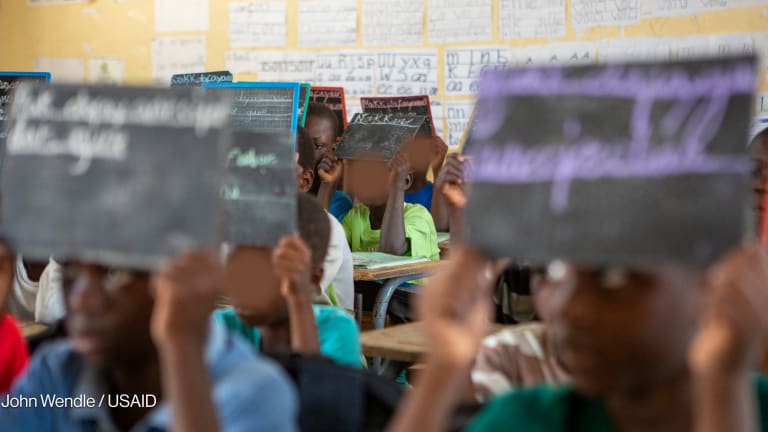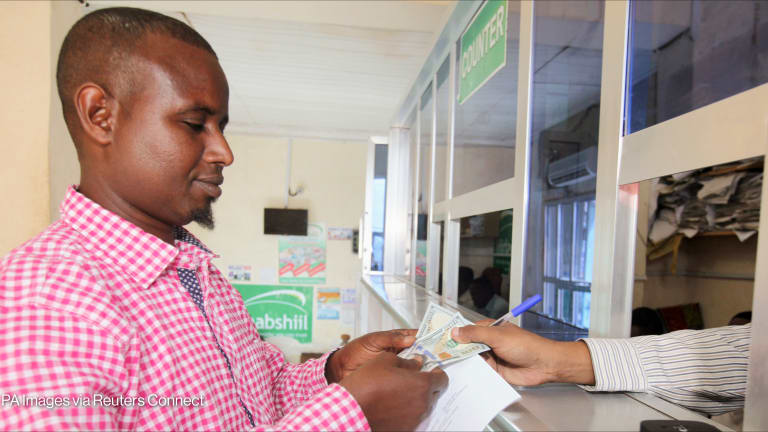
OAKLAND, California — On Tuesday, Philanthropy University, a nonprofit education initiative that offers free online courses for social changemakers, is launching its new platform, the organization exclusively shared with Devex.
What sets this organization apart in the crowded online education space is its focus on capacity building for local organizations in emerging economies. Based in Oakland, California, Philanthropy University is on a mission to impact 100 million people by 2020. This new platform is part of what the organization and its partners describe as “capacity building 2.0,” in part because it will offer not only content but also community.
“We’re reimagining capacity building for the digital age,” Connor Diemand-Yauman, chief executive officer of Philanthropy University, told Devex. “What that means is we’re challenging assumptions and practices about how to best strengthen civil society and how to measure that strengthening. All of our work is based on a deeply held belief that all development rests on the back of these local changemakers. And yet, in many cases these changemakers and their unique needs have been overlooked.”
Saudi philanthropist Amr Al-Dabbagh, whose family’s Stars Foundation has worked in a variety of ways to support local organizations in the “global south,” donated several million dollars to launch the initiative. In 2015, Philanthropy University partnered with the Haas School of Business at the University of California, Berkeley, and NovoEd, a for-profit education technology company that operated the technology platform, and offered seven courses. After its launch, the organization saw 500,000 enrollments, with 240,000 learners signing up for multiple courses. Sixty percent of those students were from developing countries.
“We realized from our early pilots that our challenges and more specifically the challenges of our users would require custom technology,” said Diemand-Yauman. “Local changemakers have unique capacity building needs and it’s our team’s job to meet those needs with innovative, tech-enabled, and scalable solutions.”
New ways of thinking
Last year, the organization put a pause on its content, and began to develop a new digital interface. The team wanted to optimize for internet limitations and allow practitioners to connect with their peers so they could learn from one another. Because there was no digital interface designed for these users, the team decided to build the platform from the ground up, relaunching it this week.
“I learned as much as my students did the first time around,” said Tom Wolf, who teaches three of the seven courses Philanthropy University will offer to begin with: Introduction to Fundraising; Fundraising: Connecting with Donors; and Fundraising Strategies.
Wolf talked about how he adapted what he might normally teach as he learned to understand the unique challenges that learners from developing countries face. These challenges include technical limitations, such as slow video streaming speeds, which Philanthropy University is accounting for in new ways, including constructing Massive Online Open Courses entirely from podcasts for low bandwidth accessibility. But there are also unique challenges facing individuals who try to fundraise in these markets, such as a lack of local capital, meaning not all of his advice can translate to a developing country context.
“We are moving away from what we have been calling in the capacity development field ‘capacity development 1.0,’” said Barney Singer, director of leadership and organizational capacity building programs at FHI 360, which developed a Planning for Monitoring & Evaluation course in collaboration with Philanthropy University.
Topics that have not traditionally been part of organizational development curricula, such as social network development and analysis, have grown in importance, he said. Instead of just asking FHI 360 to turn over its materials, Philanthropy University worked closely with it to develop outlines of modules, he added, suggesting that the way this new platform will bring together communities of practice presents a rich opportunity for community building — part of capacity building 2.0.
“Philanthropy University is bringing forward a platform that combines the kinds of resources we’ve been using with an approach that will engage learners in an interactive way,” he said. “This feels like the right moment for something like this to succeed.”
Measuring success
Maurice Omondi completed all seven online courses with Philanthropy University in 2016 and 2017 when he worked at ActionAid International as a fundraising adviser. Based in Nairobi, Kenya, he told Devex via email that he learned about the value of omnipreneurship, a term Al-Dabbagh uses to capture taking an entrepreneurial approach to every aspect of life: Business, family, community. Now, as executive director of the Strathmore University Foundation, he draws on the skills he learned in financial modeling, project planning and implementation, and fundraising, he said.
“This radical vision of reimagining capacity building requires us to look for new approaches, and only by doing things differently can we as a sector do better, and that’s why we coalesce around that statement of reimagining, because we have to do things differently if we are going to do better for these local changemakers,” Diemand-Yauman said.
The road to real results for online learning in developing countries
MOOCs promise the potential for universal access to education — but some argue that the global development community needs to shift the metrics of success to realize this goal.
He left the Silicon Valley-based edtech company Coursera to lead Philanthropy University, motivated in part, he said, by a desire to shift the emphasis from “outputs,” such as completion rates, to “outcomes.”
“We have to realize that outputs like completion rates tell us very little about genuine outcomes,” he has told Devex previously. “You optimize for completion and eventually you end up creating cat videos. And as much as I love cat videos, they won’t enable people to live better lives; they won’t equip changemakers to have greater impact in their communities. We can do better than completion.”
Philanthropy University sent Devex a deck connecting its work with the Sustainable Development Goals. According to the deck, the organization is going beyond old models of capacity building by providing free online courses and creating vibrant online communities. By celebrating the most promising learners and connecting them with sources of capital at its annual awards programs, it is helping these local organizations realize their potential, the deck explains. And by mobilizing donors, policymakers, and businesses to better support the work of these local organizations, it plans to help these groups identify the partners they need to achieve large-scale change.
Diemand-Yauman explains that while Philanthropy University may be only a few years in, it is drawing on over a decade of research and development from its partners.
Beyond the three fundraising courses and the monitoring and evaluation course, other classes include Human Capital Strategy, in partnership with +Acumen; Girl Centered Design, in collaboration with GirlSPARKS, a global training initiative by MercyCorps; and Essentials of Nonprofit Strategy, taught by Paul Brest, former dean of Stanford Law School and former president of the William and Flora Hewlett Foundation.
Communities of practice will complement this coursework, the organization says, bringing together peers with similar focus areas.
Philanthropy University is far from the only organization working to improve the capacity of local organizations, but it aims to do so in a measurable way, following not only the numbers of learners active on its platform, but also what percentage of individuals report improved competency and what percentage of organizations report improved capacity.
“If you get 100 development leaders in the room, 99 percent of them will agree capacity building is really important, and that we need to work together to do it better, but you can’t do it better if you’re not measuring it,” Diemand-Yauman said.
He acknowledged that one of the challenges in measuring organizational effectiveness is that it takes a year to demonstrate that an organization has improved on indicators.
“I’ve never been more confident that a better world is on the horizon for local civil society and the millions of beneficiaries they serve,” Diemand-Yauman said. “The challenge is immense but so is the opportunity, and we are well poised to seize it.”
Search for articles
Most Read
- 1
- 2
- 3
- 4
- 5








